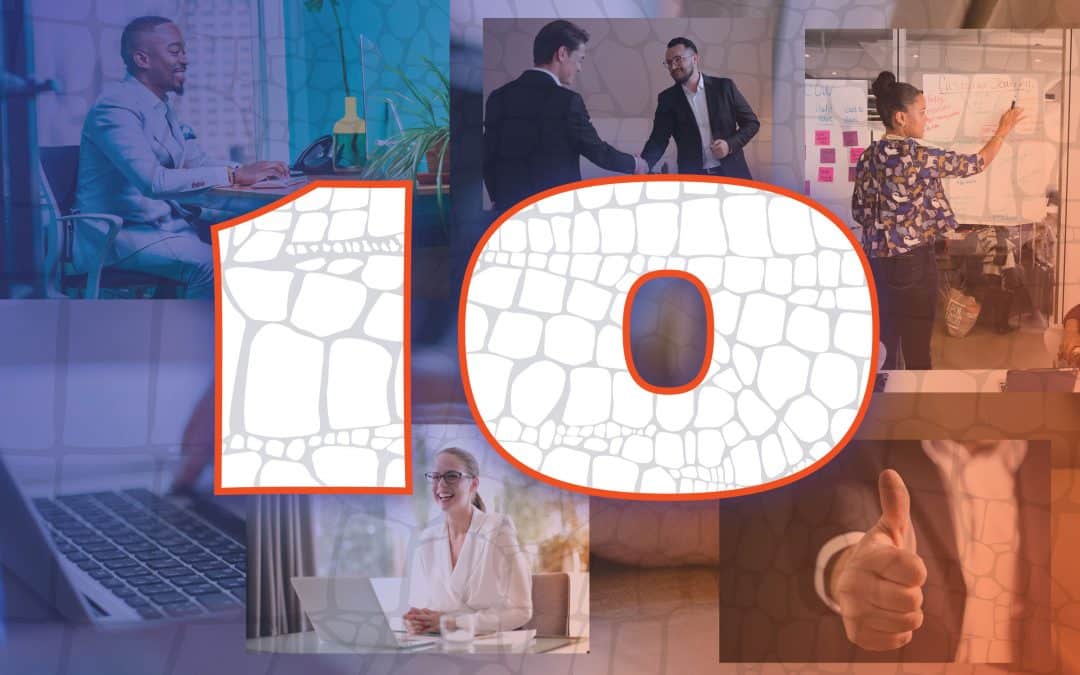10 innovative research insights you can apply to your life and career
Beyond educating the next generation of business leaders, faculty at the UF Warrington College of Business are researching the next great solution that you can use to propel your life and career forward. In this story, we share some of their recent insights that you can apply in real life, from how to build a great team to how to use social media to your advantage when creating a stock portfolio.
1. Want to increase your team’s performance? Gender diversity could be beneficial.
Many of us have heard the famous adage ‘teamwork makes the dreamwork’ from leadership author John Maxwell, but what is the key to actually making a team work?
New research from Warrington’s Yixuan Li and Klodiana Lanaj offers insights into an aspect of how to build a high-performing team. Gender diversity on self-managing teams was found to be beneficial rather than harmful to teams, as long as team members were interested in learning from each other.
Read how gender diversity could benefit your team.
2. How to be a good coworker.
Enjoying your job stems from more than just the work you do. Anyone who’s experienced having a great coworker or having a not-so-great coworker can attest to how critical it is to have positive relationships with the people you spend your professional life with.
To learn how to make the most of your in-office relationships, we asked Warrington’s Amir Erez, Klodiana Lanaj and Brian Swider for their best tips on being a good coworker.
Read their research-backed advice, like being a perspective thinker and expressing gratitude.
3. Building resiliency at work through self-compassion.
As we continue to live with the impact of COVID-19, several challenges still hinder us from returning to a world of normalcy. From new variants to global supply chain interruptions to rising inflation, these disruptions have significantly impacted our work and personal lives.
Now, more than ever, is when being resilient will help us weather the persistent and pervasive pandemic.
New research from Warrington’s Klodiana Lanaj and Ph.D. alumna Remy Jennings identifies a practical tool based on self-compassion that can help you build resiliency at work.
Jennings, Lanaj and You Jin (YJ) Kim of City University of Hong Kong developed an intervention to activate a mindset of work self-compassion in which employees reflect on a time that they have been self-compassionate in the past when facing a hard time at work.
Read how you can incorporate the work self-compassion mindset.
4. Why retailers sell generic brand items, despite low sales.
Search ‘women’s tops’ on Amazon, and the online retail giant will yield more than 100,000 results. Some of the brands will likely be familiar – Nike, Hanes, Calvin Klein – but there are also a number of brands that don’t have the same name recognition.
Many of these brands are generics made by retailers like Amazon. In fact, Amazon offers 66 clothing sub-brands in its lineup of private labels, but such generic brands account for only 1% of all store brand sales.
While it may appear that companies like Amazon are simply trying to provide consumers with options, new research from Associate Professor Amy Pan, McClatchy Professor Asoo Vakharia and alumnus Quan Zheng of the University of Science and Technology of China notes that there is a reason companies offer what are called ‘decoy products’ amongst their lineup of options.
The researchers find that retailers include decoy products from high-cost manufacturers (like Amazon’s generic brands) in an assortment of options from low-cost manufacturers (like name-brand items) because it helps companies obtain better contractual terms from active low-cost manufacturers.
Read more insights in the full research story.
5. Gainesville’s mixed-use housing buildings have an abundance of vacancies. Why?
The high retail vacancy rates are highlighted in a recent study by the Kelley A. Bergstrom Real Estate Center at the University of Florida’s Warrington College of Business.
It identifies six of the most popular mixed-use student housing properties near the university.
Despite tenant rates that are at or near capacity, the report found that four of the buildings have a majority of its retail space vacant, two of which still have no tenants since opening.
Read more in this story from The Gainesville Sun.
6. How smartphones influence purchasing behavior, human interaction.
In 2020, City Furniture Professor Aner Sela researched how behaviors change when people do certain activities on their phones rather than on a computer or in person. The study found that when people purchased items on their cell phones, they were willing to pay more for items that they viewed as expressive and unique. He hypothesizes it is because people feel more in tune with their emotions when using the device.
Hear more from Sela about his research in this story from ABC News | Denver 7.
7. The double-edged sword of being politically correct at work.
Imagine that over the weekend, you heard a joke that made you laugh so hard that tears streamed down your face and your stomach cramped. At the time, you couldn’t wait to share this joke with your coworkers – you wanted to give them a good laugh to start the week!
Once Monday rolls around, though, you realize this joke maybe won’t go over so well with some of your colleagues, so you decide not to mention it.
This self-censorship is an example of being politically correct at work.
While new research from Warrington’s Klodiana Lanaj shows that being politically correct at work is motivated by a desire to benefit coworkers, it can also be a double-edged sword and end up harming an employee’s relationships outside of the office.
Specifically, the research found that when employees were politically correct at work, they ended up feeling more exhausted at the end of the workday, causing them to lash out at home.
8. Trying to choose which job you should take? Question your intuition.
When you’re on the job hunt and the market is saturated with opportunities, you may find yourself in the position of having to make a choice between two or more job offers.
While making the decision to take or not take a job isn’t necessarily an easy one, new research from Warrington’s Brian Swider highlights that your initial offer preference plays a significant role in your decision.
In two studies, researchers at the University of Florida and University of Cincinnati found that job applicants’ initial preferences about their offers influenced both how they interpreted information about their offers and their final decision.
Based on the research, read Swider’s recommendations for choosing which job is best for you.
9. Looking for stock investment tips? Use social media selectively.
Savvy investors and news buffs will recall the early days of 2021 when GameStop’s market value increased from about $2 billion to over $24 billion in just a few days. The significant gains stemmed from individual investors, who drove the gaming company’s stock to new highs based on a chain of conversation within the social media channel Reddit.
This is just one example of how social media is an increasingly utilized resource by investors who are looking for insights into their next stock trade.
However, new research from Warrington’s Baolian Wang notes that the investment information users post on social media should be taken with a grain of salt. Specifically, Wang found that investors are more likely to post on social media about their stocks the better their stocks have performed.
10. Electronic health information exchange key to healthcare efficiency, quality, savings.
Visits to the emergency room are generally not the kind of trips most people look forward to taking. While the care emergency departments provide is critical to patient outcomes, many individuals aren’t looking to hang out in the hospital for longer than necessary.
New research from Warrington’s Emre Demirezen offers a welcome respite to the patients who find themselves in need of emergency care and the healthcare staff who provide such tending. According to his research insights, the ability to share patient information between entities through health information exchanges (HIEs) is critical to shortening hospital stays, reducing readmission rates and providing cost savings.
Read how much hospital stays could be shortened by, according to Demirezen’s research.




